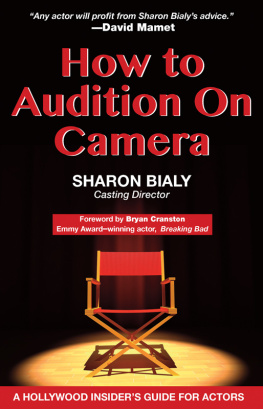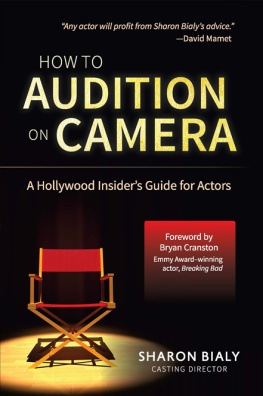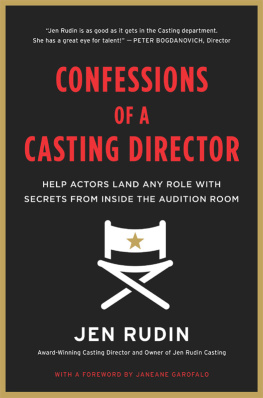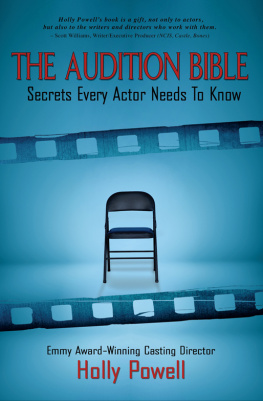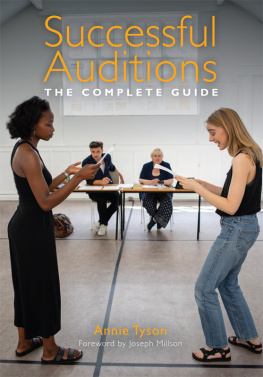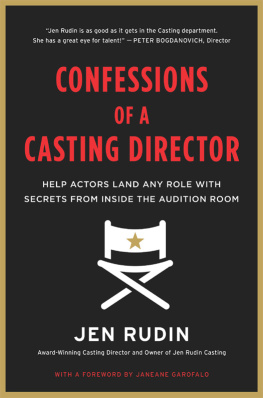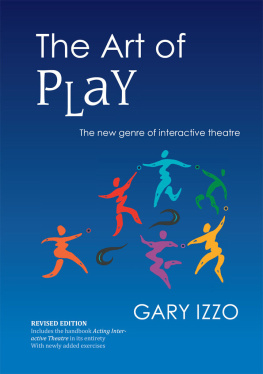Actors Guide to
AUDITIONS &
INTERVIEWS
MARGO ANNETT
THIRD EDITION

Methuen Drama
Third edition 2004
Second edition 2001
First edition 1995
Methuen Drama
A & C Black Publishers Limited
36 Soho Square
London W1D 3QY
www.methuendrama.com
Print ISBN: 978-0-71366-821-6
Ebook ISBN: 978-1-40811-654-8
Copyright 2004, 2001 Margo Annett
Copyright 1995 Margo Annett and Nikolas Simmonds
A CIP catalogue record for this book is available from the British Library.
All rights reserved. No part of this publication may be reproduced in any form or by any means graphic, electronic or mechanical, including photocopying, recording, taping or information storage and retrieval systems without the written permission of A & C Black Publishers Limited.
Contents
This book is intended as a guide for the working actor as well as the student and those just starting out on their career. Through working as an actor myself and then as a director and teacher, I have gained considerable practical knowledge of the various processes of casting and first-hand experience of how it feels to be on the receiving end on both sides.
I came to realise how often there is a huge gap between the expectations of those involved. As an actor it seemed so hard to gauge exactly what was wanted how to make oneself into a desirable commodity, to do yourself justice, and how to control destructive nervous tensions. It was all too easy to see those in a position of selecting actors for either professional work or drama college as omnipotent beings without human frailties or feelings. As a selector, time and time again, I watched actors courting failure with unsuitable, ill-prepared and badly presented audition material, wrestling with sight-reading or behaving in such a way at an interview that it was all too obvious that they had no idea how to handle the situation or how to present themselves. Clearly help was needed!
I decided not only to draw on my own experiences but also to ask those whose business it is to cast or provide actors with employment, to give advice and comments on how to succeed, what not to do and what it is they are looking for.
I was aware that few, if any, actors training courses give any tuition on sight-reading or interview techniques and allocate little time to developing the necessary skills to choose and work effectively on individual audition speeches. Feeling that these were vital to any actor, I have included specific chapters covering these in detail, together with tips on how to put them successfully into practice.
In addition, as the media have developed and expanded, the methods of casting have diversified and adapted to meet the new requirements. Even experienced actors have found themselves at a loss at castings, with little or no idea of the particular format employed or what will be expected of them hardly the ideal circumstances in which to give of your best. I have therefore included a comprehensive section on the differing types of castings an actor might encounter.
As you will see as you read through the book, casting neednt be a traumatic experience, and although success cant be guaranteed every time it can be made more likely. And you will learn that there are a lot more people on your side than you think.
Actors throughout the world have one vital factor in common in order to practise their art they need an audience. You can act by yourself for fun or as a form of therapeutic release but to complete the creative process you must communicate with an audience, however large or small.
Professional actors have to persuade others to employ them. Unfortunately these employers are disinclined to hire on trust. A straightforward, and no doubt accurate, assurance of your acting skills rarely secures a job. The employers need convincing. This is achieved through the processes of auditioning and interviewing. So many professional actors, let alone aspiring ones, are terrified of these procedures; they forget that they are for their own benefit as well as for the benefit of the prospective employer. It is the actors opportunity to show off their talent: they are active and powerful participants, not passive victims. Without these occasions actors would be unable to meet potential employees and use them as a means of reaching their ultimate goal the audience.
In order to get the best out of the situation it is obviously important to know as much about the proceedings as possible.
Since the advent of film and then television the entertainment business has expanded and diversified. Today the job of acting covers so much more than in the days when it referred to working purely in a theatre. The demands made on actors seem to grow daily; it is quite usual for them to audition for a commercial and a Shakespeare play on the same day. In spite of this enormous increase in the different types of work available, ironic though it may seem, the competition for it is greater than ever. It is hard for actors to find their way through the maze of different casting systems in the various branches of the media.
Nowadays, the traditional audition, where an actor is called upon to perform a prepared speech, is only one example of the ways in which an actors suitability for a role is tested.
The interview has become universally used as an important casting method either on its own or in conjunction with auditioning or sight-reading. The interview consists of a formal chat between the actor and one or more others involved in the proposed production, i.e. the director, the casting director, the producer, the writer and all their various assistants (PAs). There is rarely more than four of these present at one time, but it can seem a formidable sea of faces to an actor entering the room. The nature of the interview depends on which branch of the media is doing the casting. An actor attending interviews for a TV film, a commercial and a fringe production will have three very different experiences.
Sight-reading has become a vital skill for an actor; it is very unusual to be offered a job, unless you are very well known, without having been asked to read from the script at some time during the proceedings.
Actors have to cope with these multifarious casting situations and it is easy to lose sight of what is really wanted especially when there are so many other actors competing for the same job.
To make their plight easier I have asked those who really know, the people who are in the business of interviewing, auditioning and in some cases handing out the jobs, to give their advice on what is wanted and what is not. They have been generous in their response. Some have encapsulated their comments in one succinct line, others have made a number of observations and then elaborated on them, but all have shown understanding and sympathy towards the actor who has to undergo the twin ordeals of auditioning and being interviewed.
Wyn Jones, Head of Acting, Guildhall School of Music
& Drama and theatre director
Lets go back to the beginning and look at some advice that applies to aspiring actors as well as those who are experienced. Wyn Jones is eminently qualified to offer just such guidance. He is an experienced theatre director, responsible for many successful West End productions, and is now Head of Acting at the Guildhall School of Music and Drama. He feels that casting is essentially a matter of instinct and enthusiasm. It is additionally, as he puts it, A question of how they respond to me, as well as how I respond to them. He makes the valuable point that most casting comes down to a matter of taste. Two directors can interview the same actor and disagree violently in their opinions as to his or her talent. If you dont succeed in getting a job from one director you may easily land one the next day with another. After those words of comfort he adds a warning. Jobs can be won or lost on sight-reading.


